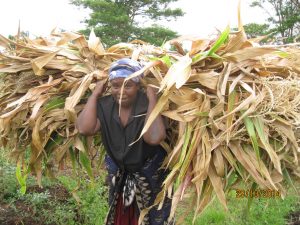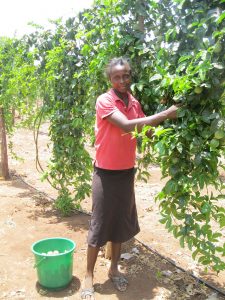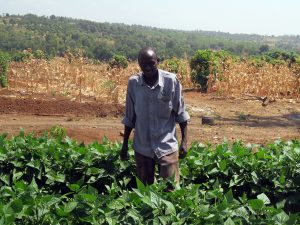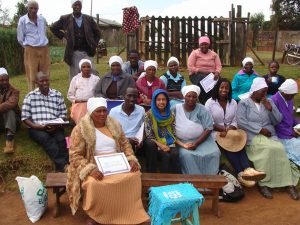By Aarti Krishnan, PhD researcher, Global Development Institute
As clouds scudded across a beautiful crimson sky, I remember sensing a knot in the pit of my stomach. To be honest, it was the anticipation of going to an unknown country, but I do, however, recall blaming it on aeroplane food. It was my first time visiting Kenya and as the aeroplane finally landed, I remember feeling unprepared for what lay ahead despite, all the fieldwork preparation I had done, the journal articles and reports on horticulture farmers I spent months reading and the ideas I came with on it might be. Especially because Kenya was only known to me through reading published articles and what I saw on TV!
Isn’t that how many of us start out with fieldwork? Brimming with notions of what we believe could possibly be true. This partial certainty (it is short-lived as many PhD researchers will attest to) that our ideas may actually have some critical mass, comes from the fact that we gather extensive knowledge during our first reading year, albeit through secondary sources at the start.
I have always found it hard to place myself as a researcher on the development studies spectrum, like many others I too am multi-disciplinary. My work speaks to economists as well as economic and environmental geographers and therefore, I have been labelled by qualitative researchers as being a positivist and by economists as being a critical realist. Both research paradigms are tough realms to conquer! So I did what I thought was best and wore the only hat that I was sure of, the ‘practical one’, a passive critical realist that comes from meticulously scourging the internet for everything I could find on horticulture production networks in Kenya and formulating an educated hypothesis of the underlying drivers. Armed with that knowledge I began the process of extrapolating what I thought might help answer my research questions.
PhD Fieldwork #101- the blackhole effect: Stress and time pressures are something you sign on for when you begin a PhD. I came to Kenya looking for solutions to what I thought were complex, yet well structured questions. However, the more I learned, the less I knew. Halfway through my six months of fieldwork I ended up with a whole bunch of new and more convoluted questions than I had come with! It felt like I was floating in a blackhole with no sight of light!
 PhD fieldwork #102- the sponge effect: I feel like I am always behind, and that I need to talk to ‘every stakeholder’ that is relevant however distantly to my research to get a holistic picture of what might really be happening. I did this by plunging into fieldwork, and like a sponge soaked up as much information and knowledge as possible, with hopes of wringing out the answers to my research questions.
PhD fieldwork #102- the sponge effect: I feel like I am always behind, and that I need to talk to ‘every stakeholder’ that is relevant however distantly to my research to get a holistic picture of what might really be happening. I did this by plunging into fieldwork, and like a sponge soaked up as much information and knowledge as possible, with hopes of wringing out the answers to my research questions.
PhD fieldwork #103- the Oceans 11 effect: Different researchers plan differently, some plan each day meticulously, with a detailed excel sheet, stylized fonts and highlights for different stakeholders and locations. While other researchers may want to take a more fluid approach and go with the flow. I began optimistically with the former, but ended up doing a bit of both. Planning in advance is all well and good, however the world does not dance to your schedule! I came to this realization after being stood up twice for the same interview in a matter of days. My advice – stay flexible, if you plan like in Oceans 11 … and it works, then you are definitely in a movie!
After interviewing a considerable number of stakeholders, I reached – what I think can be called a tipping point…where I had to make a choice about how I felt about my research and how actively I wanted to be part of it. Either I could decide to keep my practical passive hat on and continue to ‘listen’ but not really ‘hear’ what I was being told. Or I could allow the heartfelt discussions with the wonderful people I interviewed to really sink in and manifest itself in my work with a researcher-activist hat on. This mean meant actively seeking ways to create tangible positive outcomes for them. Both hats are very dynamic, but have their own pros and cons.
I was able to talk to over 600 fruit and vegetable farmers from central Kenya, who told me their stories not only through my rather impersonal questionnaires, but through their actions. Every farmer I visited, shared the little they had with me, be it some of their precious export quality fruits, their humble and delicious lunch and tea at times. How could I not feel privileged?
 After such moving interviews, I spent a few minutes looking at the last farmer I interviewed on day 125, unsure of whether I would be able to only wear my passive researcher hat anymore. On one hand, I wanted to finish my PhD on time, while on the other I also wanted to help the people I met in whatever small way I could. I just was not sure of the best way to do that. It is common knowledge that most PhD students are eternally broke!
After such moving interviews, I spent a few minutes looking at the last farmer I interviewed on day 125, unsure of whether I would be able to only wear my passive researcher hat anymore. On one hand, I wanted to finish my PhD on time, while on the other I also wanted to help the people I met in whatever small way I could. I just was not sure of the best way to do that. It is common knowledge that most PhD students are eternally broke!
I had spent almost six months absorbing stories of struggle and survival melded with stories of hope. At the end of fieldwork, I remember sitting amidst a beautiful mangrove, contemplating how I should feel at the very end…happy that I got the answers I came for? Sad that it is over? Content with what I had understood? Or more confused about what was really ‘real’? Should I have some greater more profound feelings that people feel at the end of difficult and stressful journeys? But I don’t remember feeling any of it. Instead I left Kenya feeling a bit anxious, still pondering how I could juggle my hats in a way that did justice to both my research and to the amazing people that I had encountered.
It took me a while after coming back from fieldwork to realize what Kenya had given me. It was an opportunity to tell two stories. One that was full of practical wisdom, the one that I knew is what a PhD thesis is meant for… while the other one that woke the activist in me, who wanted to make a difference no matter how small.
 It was only after this roller coaster of an experience did I realize that a PhD is not just a piece of intelligent well researched work- that is meant to sit on shelf somewhere; it is like a piece of art that needs to be shared. The PhD fieldwork experience not only brought out the practical researcher in me but the activist one too- enabling me to take the middle ground and pen down their story wearing both my hats.
It was only after this roller coaster of an experience did I realize that a PhD is not just a piece of intelligent well researched work- that is meant to sit on shelf somewhere; it is like a piece of art that needs to be shared. The PhD fieldwork experience not only brought out the practical researcher in me but the activist one too- enabling me to take the middle ground and pen down their story wearing both my hats.
PhD Fieldwork #104- The dust storm effect: my fieldwork went by like a storm, starting slowly, with highs and lows, then speeding up and before I knew it I was back in the UK, seated on my familiar desk with a cup of coffee. That being said, fieldwork turned many stones. It motivated me in ways I didn’t know were possible… it offered me the promise that both my hats together would not only be enough for a PhD, but also lit up a path that might last me a lifetime. I went to Kenya with a single hat, and came back with at least two and a rabbit in both and who knows how many more hats are in store. So I guess I just want to remind fellow researchers out there to never underestimate the magic PhD fieldwork can bring!
